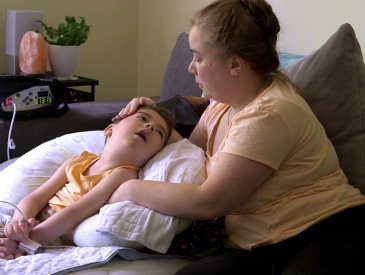Informed Consent
Informed Consent is a voluntary agreement to participate in research. It is the name of a form to be signed. Behind the agreement is a process in which the child and their parent/guardian gain an understanding of the research and its risks. You will meet with the research team to review the document before you agree to participate in the trial. During the meeting the research team will explain the key elements of the study and what your family’s participation will involve. This conversation, or series of conversations, should include an explanation of all the procedures and the risks associated with each one.

Your Team:
The individual ultimately responsible for the overall conduct and management of the study.
A lawyer.
The person responsible for the day-to-day management and coordination of research studies.
Groups that represent and support patients and their families/care partners.
A professional who provides legal guidance and support to individuals and organizations, advising on legal rights, obligations, and potential courses of action.
The Principal Investigator and Study or Research Coordinator will explain the Informed Consent document and review all of the information. A patient advocacy organization can be helpful in the process. You may also wish to review the document with an attorney or legal advisor.
The Informed Consent document is legally binding. Therefore, it is very important that you fully understand the design and scope of the trial, and what your obligations will be if you choose to have your child participate. As you are reviewing the document:
- Do not let the excitement of participating in the trial distract you from the importance of understanding all that participation entails. Feel free to ask as many questions as you like.
- Keep in mind that at the start of a trial it is not yet known if the new treatment will be of benefit. Likewise, it may not be known if the treatment will cause side effects. Being clear about your hopes for participation (improve your child’s prognosis or quality of life; contribute to scientific research) can help guide your decision.
- Do not feel rushed to sign the Informed Consent document. The document is often long and will include legal terms. Take your time and read it carefully. Ask questions. The CPN guide “Guide to Informed Consent” includes a printable list of suggested questions.
- Remember: you have the option to include a trusted friend or family member in the process and/or to take the document home and to discuss with a provider, family member or friend.
This is the time to consider not only the medical risks and benefits of participation, but also what impact participation might have on your day-to-day life: partnership, job, other children, other commitments. These concerns, while they may be secondary to the risks and benefits associated with your child’s participation, will likely be the things that become challenging day to day. Your thoughts about them, together with experience, should help you consider whether you will be able to remain committed to participating in the clinical trial.
Only sign the document when you feel you have complete understanding. Knowing that you have the information you need will make you more confident and comfortable with your decision.
Related Resources
-
 Informed consent. Take it seriously.video
Informed consent. Take it seriously.video -
 Clinical Trials: a Study Coordinator reflects on the Emotional Costsvideo
Clinical Trials: a Study Coordinator reflects on the Emotional Costsvideo -
 Clinical Trials: Informed Consent defined. Parents and providers together making the best decision based on the limited information availablevideo
Clinical Trials: Informed Consent defined. Parents and providers together making the best decision based on the limited information availablevideo -
 Guide to Informed Consentguide
Guide to Informed Consentguide -
 The Screening Visit: You Will Be Asked to Sign the Informed Consent Form, the most important document.video
The Screening Visit: You Will Be Asked to Sign the Informed Consent Form, the most important document.video -
 Clinical Trials: A mom: Don’t feel rushed, don’t feel desperate – read the Informed Consentvideo
Clinical Trials: A mom: Don’t feel rushed, don’t feel desperate – read the Informed Consentvideo